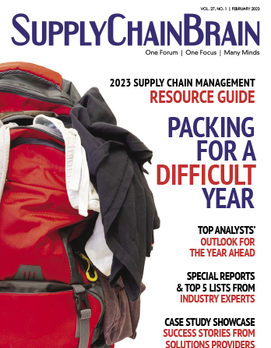
In order to access your account, please login below.
Think Tank
Is Your Supply Chain Prepared for a Recession?

Photo: iStock.com/solarseven
Inflation and recession: two words that keep both consumers and chief financial officers up at night. As the first rises and the second looms, companies are compelled to take a close look at their production, supply chain and sales practices.
To emerge from a recessionary period leaner and better equipped to scale during expansionary periods, businesses need the right people, strategies and tools to make the supply chain recession-proof. Following are some tips for achieving those objectives.
Automate and optimize. Automation is crucial during recessions because it can save valuable cashflow and prevent the need to pass on higher costs to customers. It supports a leaner operation while setting up the organization up to scale more effectively as markets return to broad expansion.
By integrating the enterprise with its supply chain — including sales, fulfillment and procurement channels — an organization can save on all fronts. It can reduce processing spend, and reallocate employees to tasks that generate higher customer value and contain costs. For example, an integrated electronic data interchange (EDI) system can automate communications across the supply chain for faster processing. It can also drastically reduce data errors that lead to chargebacks and returns, as well as dramatically improve cash flow.
Focus on being customer centric. Keeping customers happy is vital to maximizing sales and building the brand. When developing plans, consider these key questions:
- What customer service metrics might be threatened during a recession? When operations are under duress, order accuracy and fill rates can suffer. Prioritizing supply chain plans around these metrics can help safeguard customer satisfaction.
- Which channels or products offer room for growth? Consider whether there are product alterations that could increase sales, or new ways to access the audience, be it via brick-and-mortar stores, e-commerce, marketplaces or social media.
- How can you ensure reliable, timely delivery? In B2B sales, late deliveries don’t just damage trade relationships; they can incur hefty fees from retailers. Among retailers and direct-to-consumer brands, poor delivery timelines can erode customer reviews.
- For B2B suppliers, what enhanced services can you offer downstream partners? Continuously thinking about how you can add value to your partners shows that you want to be there for the long haul — that you're invested in each relationship, and want to build a more sustainable and competitive supply chain in service of your customers.
Partner with third parties to improve efficiency. You can’t do it all, even when business is booming. And because recessions often go hand in hand with higher unemployment, you’ll be trying to do more with less. Companies that find ways to take advantage of partnerships see higher returns during tough times.
Third-party logistics providers offer another way to take the burden off internal operations. They can handle everything from inventory storage to order fulfillment. #PLs offer the benefits of warehouse automation, such as advanced robotics, without costly capital investment.
Certain partners within the supply chain can used to outsource critical processes. Take inventory management: Why rely on traditional ordering and replenishment, when you could transfer that responsibility to suppliers via a collaborative process such as vendor-managed inventory?
Harness the power of data to drive the business. Often, businesses find themselves awash in a sea of data that’s unusable, stale or inaccurate. Accurate data is the new currency in supply chain, especially when delivered in real time and served up in the proper format to the right decision-makers.
An inevitable by-product of economic downturns is changing customer demand. But because every recession is different, basing supply chain plans on historical trends is unlikely to work. Instead, leading companies focus on understanding demand as it changes, and how their suppliers are performing. In the process, they’re able to determine the metrics that most influence their success, share data with trading partners to get a full view of the supply chain, and analyze buyer habits to make strategic decisions.
During a recession, these automated recommendations are critical to maintaining customer satisfaction without overreacting or overspending.
Move toward cloud-based technologies. Cloud spending driven by digital technologies is becoming mainstream. Cloud technology offers several advantages over traditional on-premises software — advantages that are even more critical during a recession.
Cloud-based software is often priced based on consumption, so organizations get the benefit of scaling down cost when activity levels decline. The option also ensures the highest level of maintenance and infrastructure support for systems, even if the internal team gets smaller or needs to focus on other critical areas during an economic downturn.
Cyber-crimes don’t stop during recessions. Cloud technologies make it harder for criminals to gain access to data, by segmenting workstations from servers and offering next-generation encryption and 24/7 monitoring.
By taking decisive action now, companies can better safeguard their supply chains against market changes and recessions. While the available options might seem intimidating, they can address multiple supply chain weaknesses simply by hiring the right technology providers. Commit to the mindset that now is the time to focus inward, and your organization will emerge stronger and ready to scale.
Mike Gross is chief product officer with TrueCommerce.




